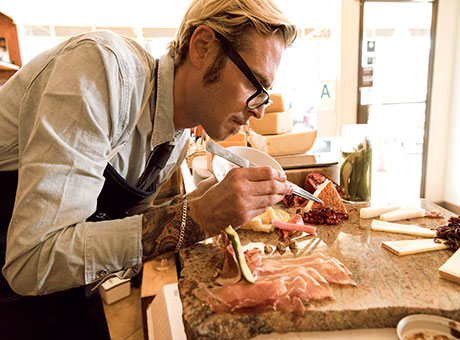The restaurant business is attractive to many entrepreneurs who dream of inviting friends to dine at their eatery or reading rave reviews for their hot new chef. While the barriers to entry in the restaurant industry are lower than in many other fields, the unique requirements and quirks of the field should cause any aspiring restaurateur to pay heed before plunging into a startup restaurant. The following are some of the most significant barriers to entry for new restaurants, many of which are fairly unique to the industry.

The Biggest Barriers to Entry for New Restaurants
Economies of Scale
While larger, more established restaurants can order in bulk and demand lower prices from suppliers, a startup can’t take advantage of these economies of scale. As a result, your startup restaurant incurs higher costs than your competitors, which means you may have to charge more for dishes than they do. Those higher prices may be off-putting to potential customers, who already have plenty of familiar choices when eating out. One way around this barrier is to provide unique offerings that attract curious diners.
Insufficient Startup Capital
Depending on location and other specifics, starting a restaurant can be pricey with costs rising drastically if real estate purchases are involved. Many aspiring restaurateurs find that lack of startup capital is one of the most significant barriers to entry in the business. Overcome this hurdle by seeking financing from friends and family as well as from banks and other sources.
Difficulty Winning Over Customers
To run a successful restaurant, you need a solid customer base. As a startup restaurateur, you face a lot of competition, and customers may not be willing to break out of their established patterns to try something new. Use every tool at your disposal to spread the word about your restaurant’s opening so you can get customers in the door to see what you’re offering.
Location, Location, Location
The location of your restaurant is one of the key factors in its potential success. Restaurateurs keep their eyes on prime locations, and you may find it difficult to lock in a choice spot. You may have to settle for a location that’s far from prime, which makes it more difficult to attract customers. Some restaurant spaces may also require a great deal of renovations, which increases your startup costs.
Regulatory Requirements
When you open a restaurant, you have to meet health requirements that can be very strict, and you’re subject to immediate closure ” even with customers sitting at your tables ” if you fail a health inspection. In addition, it can take time and money to obtain a liquor license if you intend to serve alcohol. Working with an attorney who’s experienced in the restaurant business can help clear some of these hurdles, and your local restaurant association may also be able to provide you with the information and advice you need to smooth these processes.
Plan ahead and be aware of the barriers to entry if you plan to start a restaurant, and attempt to clear as many of them as possible before you open your doors.


